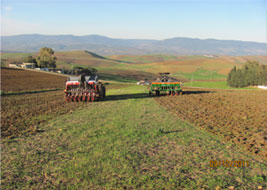 North Africa is a net importer of staple food, importing 27% of cereal grain requirements. Low productivity, high and volatile prices, and uncertain availability of food commodities affect the livelihoods of the region’s poor. The region has a Mediterranean climate with highly variable and generally low rainfall that is further exacerbated by unfavourable climate change, as in southern Australia. Soils are poor and highly vulnerable to erosion.
North Africa is a net importer of staple food, importing 27% of cereal grain requirements. Low productivity, high and volatile prices, and uncertain availability of food commodities affect the livelihoods of the region’s poor. The region has a Mediterranean climate with highly variable and generally low rainfall that is further exacerbated by unfavourable climate change, as in southern Australia. Soils are poor and highly vulnerable to erosion.
Conservation agriculture (CA) practices offer the opportunity to conserve natural resources, cut down production costs while reducing yield fluctuation and associated risks. An integrated approach is required to adapt CA practices to become attractive to smallholders, and to test extension and supply channels for quality inputs, appropriate and affordable technology, and for best practice advice to small-scale farmers.
This ACIAR/AusAid funded project aimed to promote adoption of CA by smallholder farmers in North Africa to reduce natural resource degradation and to increase productivity, profitability, and sustainability of the crop/livestock systems in the region. The collaborative project was managed by the International Centre for Agricultural Research in the Dry Areas (ICARDA-Tunis office), supported by Australian expertise and involved partners in Morocco, Algeria, Tunisia. Activities included adaptive field research experiments and demonstrations with participation from farmers and machinery manufacturers. As a collaborating partner, the Barbara Hardy Institute focussed its input to support the objective of developing and testing affordable zero-tillage seeding machinery and crop establishment systems for small to medium sized farms, by sharing knowledge and building capacity through training and research mentoring.
Project funding
This project was funded by the Australian Centre for International Agricultural Research (ACIAR) for five years (2012-2016).
For further information, please contact Jacky Desbiolles.




